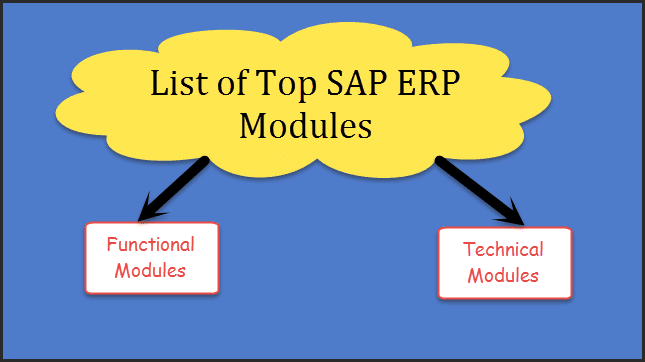SAP ERP Modules: Complete List of SAP ERP Modules
- ERP (Cloud) October 23,2023

If you want to know about all ERP Modules?
I will explain every single module and its function.
Sap is German software that helps to manage business activities like customer relations. The SAP ERP modules system comprises integrated modules that cover every single aspect of business management virtually.
ERP software allows easy global integration by eliminating barriers of currency exchange rates, language, and culture. This software Provides real-time information and create a more efficient work environment for employee. For detailed reading about sap history please use the wiki link here.
Sap software provides end to end solutions for logistics, financials, inventories and distributions. Now a day such ERP software is are being used in a large number of companies along their modules to assist the companies’ day tasks
There are 2 Types of SAP ERP system Modules. Number one is Functional Modules and second one is Technical Modules.
All SAP Modules integrated with each other with functionality and provide us best solution for Business. Most important SAP Modules that Bunnies implement for their business are
- SAP FICO module
- MM Module
- SD module
- HR module
- PP module
- PS module
- Basis module
- security module
- ABAP module
Functional SAP ERP Modules
- Human Resource Management (SAP HRM), also known as Human Resource (HR)
- Production Planning (SAP PP)
- Material Management (SAP MM)
- Financial Supply Chain Management (SAP FSCM)
- Sales and Distribution (SAP SD)
- Project System (SAP PS)
- Financial Accounting and Controlling (SAP FICO)
- Plant Maintenance (SAP PM)
- Quality Management (SAP QM)

Integration of Sap ERP Modules:
1. Sub Modules of ERP SAP FICO (FI and CO)
- SAP General Ledger Accounting
- SAP Accounts Payable
- SAP Accounts Receivable
- SAP Bank Accounting
- Budgeting and Monitoring
- Cash management
- SAP Asset Accounting
- SAP Funds management
- SAP Treasury Management
- SAP Special Purpose Ledger
- Withholding Tax (TDS)
- SAP cost element accounting
- Cost center Accounting
- SAP Product Cost Accounting
- SAP CO internal orders
- SAP Profit Center Accounting
- SAP Profitability Analysis
2. Sub-Modules of ERP SAP HR Module
- Organizational Management
- Personnel Administration
- Recruitment
- Payroll
- Travel Management
- Personnel Management
- Time Management
- Compensation Management
- Training and Event management
- Wages
- Personnel Development
- Workforce Administration
3. SAP ERP Modules – Submodules of Material Management
- Purchasing
- Inventory Management
- Material Planning
- Invoice Verification
- Material Requirement Planning (MRP)
- Warehouse Management
- Vendor Valuation
4. Sub-modules of ERP SAP Sales and Distribution
- Sales
- Shipping and transportation
- Billing or Invoice generation
- Bills of Material (BOM)
- Sales Information system
- Credit Control
- EDI (Electronic Data Interchange)
5. ERP SAP modules: – Sub Modules of Project Systems
- Project Planning
- Project Preparation
- Project Tracking
- Project Reporting
- Project Costs
- WBS Elements
6. Production Planning
- Sales and Production Planning
- Demand Management
- Material Requirement Planning
- Capacity Requirement Planning
- Bills of material
- Production Orders
- Routing
- Work Center
- Shop floor control
7. ERP SAP Modules:- Sub-Module of Plant Maintenance
- Maintenance planning
- Preventive Planning
- Service Management
- Predictive Maintenance
- Project Maintenance
8. ERP SAP module: – Quality Management
- Planning
- Process Inspections
- Notifications of Quality
- Quality Control
- Test Equipment
- Quality certifications
- General Functions
9. SAP ERP Module- Financial Supply Chain Management
- Credit Management
- Cash & Liquidity Management
- Treasure and Risk Management
- Collections Management
- Payments
- Dispute management
Technical SAP ERP Modules
- SAP Basis
- SAP Security
- Advanced Business Application Programming (SAP ABAP)
- High Performance Analytic Appliance (SAP HANA)
- SAP NetWeaver
- Information Systems Management (SAP IS)
- Customer Relationship Management (SAP CRM Technical module)
- Exchange Infrastructure (SAP XI)
- SAP Solution Manager
SAP Business Suite Applications: –
- Enterprise Resource Planning SAP (ERP SAP)
- SAP Customer Relationship Management (SAP CRM)
- SAP Supply Chain Management (SAP SCM)
- SAP Supplier Relationship Management (SAP SRM)
- SAP Product Life cycle
- SAP HANA (High Performance Analytic Appliance)
- Government, Risk and Compliance (SAP GRC)
- SAP Strategic Enterprise Management (SAP SEM)
- SAP Compliance Management for SOA
SAP Components: – SAP has developed the following additional components.
- SAP Business Warehouse (SAP BW)
- SAP Advanced Planning and Optimization (SAP APO)
- Salesforce Automation (SFA)
- Internet Transaction Server (ITS)
Advantages of SAP ERP System Modules
- No duplication of data occurs
- business processes get standardized
- Ecommerce integration
- Cost and time saver
- planning, scheduling, tracking and management became easy.
In conclusion, SAP ERP (Enterprise Resource Planning) is a comprehensive software solution that offers a wide range of modules to address various business processes.
The list of SAP ERP modules is extensive and covers essential areas such as finance, human resources, sales and distribution, procurement, manufacturing, and more.
These modules enable organizations to streamline their operations, improve efficiency, and make informed decisions based on real-time data.
By implementing the appropriate SAP ERP modules, businesses can achieve greater control, visibility, and integration across their entire enterprise. With SAP ERP, companies can optimize their resources, enhance customer satisfaction, and drive overall business success.









 Saudi Arabia (English)
Saudi Arabia (English) United Kingdom
United Kingdom Global Site
Global Site